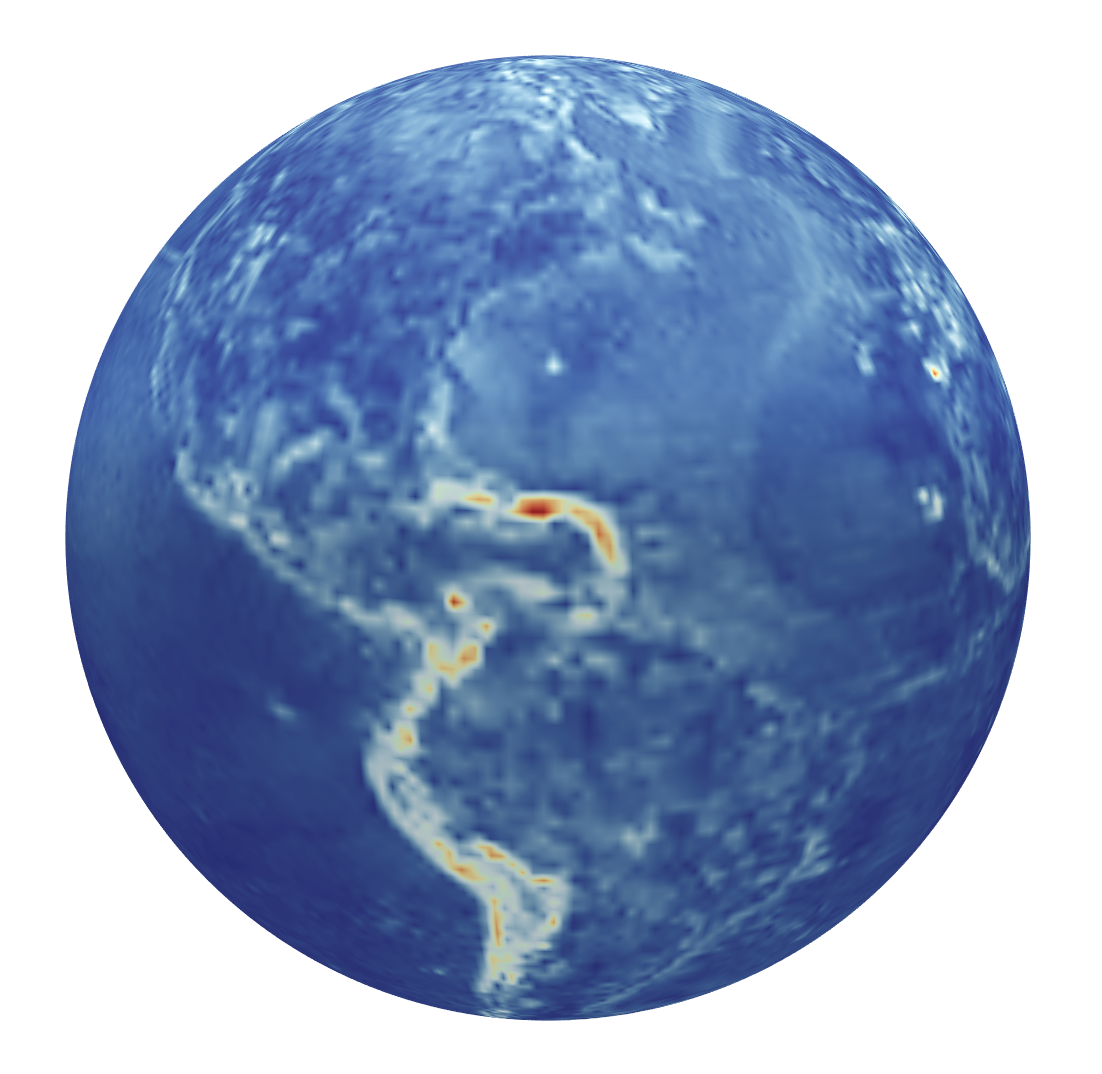Physical units, time, reference frames, environment modeling.
Gravitational field anomaly between EGM96 and WGS84 models.
Want to get started? This is the simplest and quickest way:
Nothing to download or install! This will automatically start a JupyterLab environment in your browser with Open Space Toolkit libraries and example notebooks ready to use.
Docker must be installed on your system.
The following command will start an iPython shell within a container where the OSTk components are already installed:
docker run -it openspacecollective/open-space-toolkit-physics-pythonOnce the shell is up and running, playing with it is easy:
from ostk.physics import Environment # Environment modeling class
from ostk.physics.time import Instant # Instant class
from ostk.physics.coordinate import Frame # Reference frame class
environment = Environment.default() # Bootstrap a default environment
moon = environment.access_object_with_name('Moon') # Access Moon
environment.set_instant(Instant.now()) # Set environment to present time
moon.get_position_in(Frame.ITRF()) # Position of the Moon in ITRF
moon.get_axes_in(Frame.ITRF()) # Axes of the Moon in ITRFBy default, OSTk fetches the ephemeris from JPL, Earth Orientation Parameters (EOP) and leap second count from IERS.
As a result, when running OSTk for the first time, it may take a minute to fetch all the necessary data.
Tip: Use tab for auto-completion!
The following command will start a JupyterLab server within a container where the OSTk components are already installed:
docker run --publish=8888:8888 openspacecollective/open-space-toolkit-physics-jupyterOnce the container is running, access http://localhost:8888/lab and create a Python 3 Notebook.
The binary packages are hosted using GitHub Releases:
- Runtime libraries:
open-space-toolkit-physics-X.Y.Z-1.x86_64-runtime - C++ headers:
open-space-toolkit-physics-X.Y.Z-1.x86_64-devel - Python bindings:
open-space-toolkit-physics-X.Y.Z-1.x86_64-python
After downloading the relevant .deb binary packages, install:
apt install open-space-toolkit-physics-*.debAfter downloading the relevant .rpm binary packages, install:
dnf install open-space-toolkit-physics-*.rpmInstall from PyPI:
pip install open-space-toolkit-physicsDocumentation is available here:
Structure
The library exhibits the following structure:
├── Units
│ ├── Length
│ ├── Mass
│ ├── Time
│ ├── Temperature
│ ├── Electric Current
│ ├── Luminous Intensity
│ └── Derived
│ ├── Angle
│ ├── Solid Angle
│ ├── Frequency
│ ├── Force
│ ├── Pressure
│ ├── Area
│ ├── Volume
│ └── Information
├── Time
│ ├── Scale (UTC, TT, TAI, UT1, TCG, TCB, TDB, GMST, GPST, GST, GLST, BDT, QZSST, IRNSST)
│ ├── Instant
│ ├── Duration
│ ├── Interval
│ ├── Date
│ ├── Time
│ └── DateTime
├── Coordinate
│ ├── Transform
│ └── Frame (ECI, ECEF, NED, LVLHGD, LVLHGDGT, ...)
├── Geographic
│ ├── Position
│ ├── Area
│ ├── Volume
│ ├── Coordinate Reference System (CRS)
│ └── Universal Transverse Mercator (UTM)
└── Environment
├── Constants
├── Object
│ └── Celestial
├── Ephemerides
│ ├── Analytical
│ ├── Tabulated
│ ├── SOFA
│ └── SPICE (JPL)
├── Gravity
│ ├── Barycentric
│ ├── Earth Gravitational Model 1996 (EGM96)
│ └── Earth Gravitational Model 2008 (EGM2008)
├── Atmospheric
│ ├── Exponential
│ ├── USSA1976
│ ├── Jacchia Roberts
│ └── NRLMSISE00
├── Magnetic
│ ├── Dipole
│ ├── World Magnetic Model 2010 (WMM2010)
│ ├── World Magnetic Model 2015 (WMM2015)
│ ├── Enhanced Magnetic Model 2010 (EMM2010)
│ ├── Enhanced Magnetic Model 2015 (EMM2015)
│ ├── International Geomagnetic Reference Field 11 (IGRF11)
│ └── International Geomagnetic Reference Field 12 (IGRF12)
├── Radiation
│ └── Sun Static
└── Stars
└── HipparcosTutorials are available here:
The following environment variables can be set:
| Environment Variable | Default Value |
|---|---|
OSTK_PHYSICS_COORDINATE_FRAME_PROVIDERS_IERS_MANAGER_MODE |
Manual |
OSTK_PHYSICS_COORDINATE_FRAME_PROVIDERS_IERS_MANAGER_LOCAL_REPOSITORY |
./.open-space-toolkit/physics/coordinate/frame/providers/iers |
OSTK_PHYSICS_COORDINATE_FRAME_PROVIDERS_IERS_MANAGER_LOCAL_REPOSITORY_LOCK_TIMEOUT |
60 |
OSTK_PHYSICS_COORDINATE_FRAME_PROVIDERS_IERS_MANAGER_REMOTE_URL |
ftp://cddis.gsfc.nasa.gov/pub/products/iers/ |
OSTK_PHYSICS_ENVIRONMENT_EPHEMERIDES_SPICE_ENGINE_MODE |
Manual |
OSTK_PHYSICS_ENVIRONMENT_EPHEMERIDES_SPICE_MANAGER_LOCAL_REPOSITORY |
./.open-space-toolkit/physics/environment/ephemerides/spice |
OSTK_PHYSICS_ENVIRONMENT_EPHEMERIDES_SPICE_MANAGER_REMOTE_URL |
https://naif.jpl.nasa.gov/pub/naif/generic_kernels/ |
OSTK_PHYSICS_ENVIRONMENT_GRAVITATIONAL_EARTH_MANAGER_ENABLED |
false |
OSTK_PHYSICS_ENVIRONMENT_GRAVITATIONAL_EARTH_MANAGER_LOCAL_REPOSITORY |
./.open-space-toolkit/physics/environment/gravitational/earth |
OSTK_PHYSICS_ENVIRONMENT_GRAVITATIONAL_EARTH_MANAGER_REMOTE_URL |
https://sourceforge.net/projects/geographiclib/files/gravity-distrib/ |
OSTK_PHYSICS_ENVIRONMENT_MAGNETIC_EARTH_MANAGER_ENABLED |
false |
OSTK_PHYSICS_ENVIRONMENT_MAGNETIC_EARTH_MANAGER_LOCAL_REPOSITORY |
./.open-space-toolkit/physics/environment/magnetic/earth |
OSTK_PHYSICS_ENVIRONMENT_MAGNETIC_EARTH_MANAGER_REMOTE_URL |
https://sourceforge.net/projects/geographiclib/files/magnetic-distrib/ |
Using Docker for development is recommended, to simplify the installation of the necessary build tools and dependencies. Instructions on how to install Docker are available here.
To start the development environment:
make start-developmentThis will:
- Build the
openspacecollective/open-space-toolkit-physics-developmentDocker image. - Create a development environment container with local source files and helper scripts mounted.
- Start a
bashshell from the./buildworking directory.
If installing Docker is not an option, you can manually install the development tools (GCC, CMake) and all required dependencies, by following a procedure similar to the one described in the Development Dockerfile.
From the ./build directory:
cmake ..
makeTip: helpers/build.sh simplifies building from within the development environment.
To start a container to build and run the tests:
make testOr to run them manually:
./bin/open-space-toolkit-physics.testTip: helpers/test.sh simplifies running tests from within the development environment.
| Name | Version | License | Link |
|---|---|---|---|
| Boost | 1.69.0 | Boost Software License | boost.org |
| Eigen | 3.3.7 | MPL2 | eigen.tuxfamily.org |
| IAU SOFA | 2018-01-30 | SOFA Software License | www.iausofa.org |
| SPICE Toolkit | N0066 | NAIF | naif.jpl.nasa.gov/naif/toolkit.html |
| GeographicLib | 1.49 | MIT | geographiclib.sourceforge.io |
| Core | master | Apache License 2.0 | github.com/open-space-collective/open-space-toolkit-core |
| I/O | master | Apache License 2.0 | github.com/open-space-collective/open-space-toolkit-io |
| Mathematics | master | Apache License 2.0 | github.com/open-space-collective/open-space-toolkit-mathematics |
Contributions are more than welcome!
Please read our contributing guide to learn about our development process, how to propose fixes and improvements, and how to build and test the code.
To be completed...
Apache License 2.0


